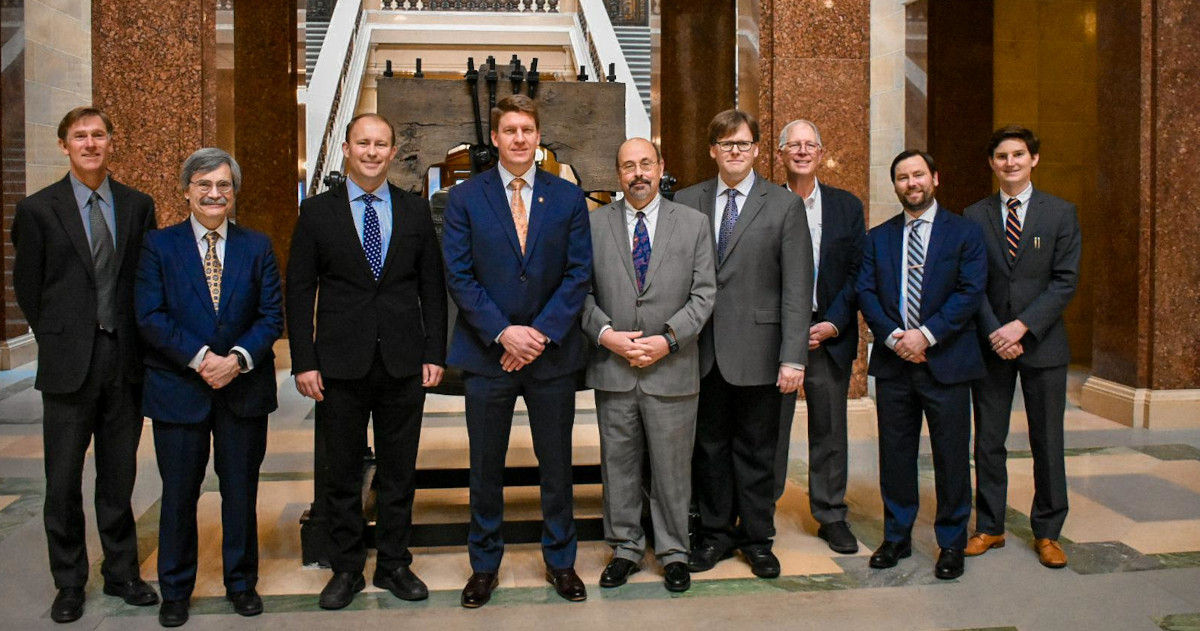Having success in the legislative process can be hard to define and quantify. It isn’t like sports where wins and losses can be easily seen and measured. Success in the legislative process or in politics can sometimes take years and at other times only weeks. The State Bar of Wisconsin’s sustained, targeted, and consistent government relations efforts led to passage of many legislative proposals during the 2021-22 legislative session.
The legislative process is often criticized and can be misunderstood. Are conflict and politics being played out in state government? Yes. Can the rhetoric and hyperbole frustrate those who work and watch the process? Yes. Yet there are also times when the system works and shows signs of bipartisanship.
The Wisconsin Legislature was very busy this session, especially during the final six to eight weeks. From early January into February, legislative committees held more than 300 public hearings and executive sessions. Just over 2,3001 bills were introduced, and 267 bills were enacted into law. The session was also historic: Governor Tony Evers vetoed 126 bills, an all-time high.
There is much uncertainty about the composition of the new legislature (after the November election). Legislative retirements are approaching an all-time high with 30 known announcements (23 in the Assembly and 7 in the Senate). Wisconsin isn’t alone in this retirement boom or, as
Governing Magazine called it in a recent article, “What’s Driving the Great Resignation Among Legislators?”2 Factors such as legislator fatigue, redistricting changes, low pay, and a general lack of civility were pointed out as reasons for the recent upheaval.

Members of the State Bar’s Business Law Section pose for a photo with the sponsors of AB/SB 566, fellow State Bar members Sen. Eric Wimberger (R – Green Bay) and Rep. Ron Tusler (R – Harrison). Pictured left to right – Atty. Aaron Gary (LRB & Uniform Law Commission), Atty. Tom Nichols, Rep. Ron Tusler, Sen. Eric Wimberger, Atty. Randy Brotherhood, Atty. Adam Tutaj, Atty. Joe Boucher, Atty. Drew Parrish, and John Cronin (Wis. Bankers Association)
Expungement Reform (A.B. 69). After two sessions of “almost,” there was renewed optimism that this was going to be the session for expungement reform to pass. Assembly Bill 69 easily passed the Assembly on a voice vote and a majority of the Senate supports the bill, but a small minority of Senate Republicans have thwarted attempts at final passage.
Justice System Funding. The final budget included pay progression and new positions for assistant district attorneys. A separate bill (S.B. 62) addressed pay progression for state public defenders, a critical step to ensure that both prosecutors’ and defenders’ offices across the state can attract and retain vital, experienced attorneys within the justice system.
Civil Legal Aid. In March 2021, Gov. Evers released his proposed Wisconsin budget. It contained two proposals that, if enacted, would have substantially increased civil legal aid funding in Wisconsin. One proposal, for indigent civil legal assistance, would have created a new allocation of $2 million per year administered by the Department of Administration. The other proposal, for grants for civil legal services, would have increased the state’s investment of federal Temporary Aid to Needy Families funding from $500,000 per year to $1 million per year. These provisions were not adopted in the budget and instead were kept at prior funding levels. In April 2022, Gov. Evers announced an $8 million grant to the Wisconsin Trust Account Foundation Inc. (WisTAF) for additional civil legal assistance as individuals continue to deal with effects of the COVID-19 pandemic.
Bail Reform. Several legislative bills dealing with cash bail were introduced in late 2021. Many of these proposals would implement minimum-cash-bail or bail-jumping requirements. The State Bar supports moving away from a cash-bail-based system to a validated-risk-assessment process, often referred to as evidence-based decision-making. In 2018, the legislature created a Legislative Joint Council Study Committee on Bail and Conditions of Pretrial Release. The State Bar supports the findings from the study committee and has urged lawmakers to consider the committee’s final recommendations. The legislature did adopt Assembly Joint Resolution 107; this is the first consideration of a constitutional amendment that would change the state constitution’s provisions on pretrial release considerations. To become a question for voters to decide in a future referendum, the joint resolution must pass the legislature again next session in its identical form.
Law Enforcement Reform. In summer 2020, the Wisconsin Assembly formed the Speaker’s Task Force on Racial Disparities, which culminated in a large package of proposed reform bills. In the Senate, Sen. Van Wanggaard (R-Racine) introduced several law enforcement reform bills as well. The State Bar took a position on several of these bills, following the work of the State Bar’s Racial Justice Task Force and the new policy positions adopted from its suggestions. The accompanying sidebar presents a brief review of those bills that were signed into law.
Law Enforcement Reform Bills Signed Into Law
2021 Wis. Act 49 (S.B. 122): Amends Wis. Stat. section 66.0511(2), dealing with public-notice requirements for law enforcement use-of-force policies. Signed by Gov. Evers on June 23, 2021.
2021 Wis. Act 50 (S.B. 123): Directs Wisconsin Department of Justice (DOJ) to collect information and demographic data and publish annual reports on use-of-force incidents, injuries, and firearm discharges. Signed by Gov. Evers on June 23, 2021.
2021 Wis. Act 51 (S.B. 124): Creates grants for community-oriented policing programs. Signed by Gov. Evers on June 23, 2021.
2021 Wis. Act 75 (S.B. 120): Creates Wis. Stat. section 175.44, which contains a standard use-of-force definition, a requirement to report noncompliant uses of force, and whistleblower protections. Signed by Gov. Evers on Aug. 7, 2021.
2021 Wis. Act 183 (A.B. 329) – Requires DOJ to report on law enforcement agencies’ use of no-knock warrants. Supported by State Bar Wisconsin.
2021 Wis. Act 184 (A.B. 335) – Directs grants for crisis-response training for law enforcement and behavioral health services emergency response programs. Supported by State Bar of Wisconsin.
2021 Wis. Act 185 (A.B. 333) – Directs DOJ to provide grants to law enforcement agencies for body cameras. Supported by State Bar of Wisconsin.
Lobbying Sections are Valuable Advocates and Issue Experts
A benefit of the State Bar’s governing structure is the ability for practice sections to advocate and lobby for policy changes in the state legislature. The State Bar’s Board of Governors sets the priorities for the profession on issues such as funding and fairness in the justice system, while the State Bar’s lobbying sections focus on their specific areas of law. The State Bar has 13 sections that have opted to participate in the lobbying program. Joining a lobbying section, like all section membership, is completely voluntary, and all sections have separate, volunteer elected boards.
In the 2021-22 legislative session, several bills resulting from State Bar section proposals were enacted after being signed by Gov. Evers. They include the following:
2021 Wis. Act 20 (S.B. 116) – Allows for modifications to legal custody or placement agreements contingent upon a future event. Initiative of the Family Law Section.
2021 Wis. Act 169 (S.B. 603) – Simplifies the process for legal separations by allowing court commissioners to address stipulated final legal separation hearings. Initiative of the Family Law Section.
2021 Wis. Act 174 (S.B. 682) – Amends Wis. Stat. section 893.33, creating an exception to the 40-year recording requirement for certain recorded access easements. Supported by Real Property, Probate and Trust Section.
2021 Wis. Act 204 (A.B. 722) – Codifies case law allowing stipulated agreements to be made final upon approval by a judge. Initiative of the Family Law Section.
2021 Wis. Act 205 (A.B. 723) – Repeals and recreates Wis. Stat. section 767.17, creating a uniform de novo process in actions affecting the family. Initiative of the Family Law Section.
2021 Wis. Act 258 (S.B. 566) – Adopts two uniform laws and brings uniformity to five chapters of the Wisconsin Statutes regarding business entity laws. Initiative of the Business Law Section.
2021 Wis. Act 259 (S.B. 604) – Clarifies the financial-information exchange process in maintenance and child support actions. Initiative of the Family Law Section.
Sign Up
Stay engaged to help move legislation forward. Learn about the State Bar’s Government Relations program and read the monthly e-newsletter,
Rotunda Report.
State Bar Advocacy Network wisbar.org/GovRelations
Rotunda Reportwisbar.org/rotundareport
Leaders in the Law. Advocates for Justice®.
The State Bar’s best advocates in the legislative process are State Bar members. The best way to have your voice heard in state government is by engaging and building a relationship with elected officials. This can be done through a personal phone call, an in-person meeting, an email, a letter, attendance at a listening session, or even social media posts or comments.
 Cale Battles is a government relations coordinator with the State Bar of Wisconsin.
Cale Battles is a government relations coordinator with the State Bar of Wisconsin.
 Lynne Davis is a government relations coordinator with the State Bar of Wisconsin.
Lynne Davis is a government relations coordinator with the State Bar of Wisconsin.
 Devin Martin is grassroots outreach coordinator with the State Bar of Wisconsin.
Devin Martin is grassroots outreach coordinator with the State Bar of Wisconsin.
The State Bar is working to make connecting with legislators easier than ever. In the past few years, the State Bar’s Advocacy and Access to Justice Department has hosted events with legislators, often in conjuction with local bar associations, in Kenosha, Fond du Lac, Stevens Point, Waukesha, and Milwaukee and has held virtual events to connect members to their elected officials. Additional events are being planned for summer 2022.
The State Bar’s Advocacy Center makes it easy to contact legislators. State Bar members can submit comments on any of the State Bar’s current advocacy campaigns or compose messages to send to their elected officials.
When contacting legislators, there are a few tips to keep in mind. 1) Develop an ongoing relationship with elected officials. This will go a long way in building trust and ongoing communication. 2) Don’t wait until a proposal is in the final stages of passage to raise an issue; it is much harder to stop or make changes at that point. The earlier in the process you contact your legislator, the better. 3) Try sharing personal stories and individual experience with elected officials. This is always the most effective way to get your message across.
Stay informed about legislative developments by subscribing to the State Bar’s
Rotunda Report and
InsideTrack publications, joining a State Bar lobbying section, and following the department on twitter
@SBWRotundaRpt. Always feel free to contact anyone in the State Bar’s Advocacy and Access to Justice Department with any question or for any assistance. Lawyers are the best advocates for the profession and the justice system!
Endnotes
1 Wis. Leg.,Status of Business in the Legislature – Period Ending April 19, 2022,
https://tinyurl.com/ypp9ujv5 (last visited May 2, 2022).
2 Alan Greenblatt,
What’s Driving the Great Resignation Among Legislators, Governing (April 22, 2022),
www.governing.com/now/whats-driving-the-great-resignation-among-legislators.
» Cite this article:
95 Wis. Law. 53-55 (June 2022).
